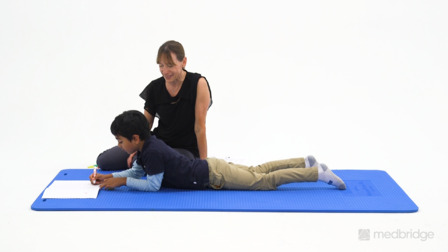Handwriting and Executive Functioning: Evidence-Based
Interventions and Adaptations
Presented by Jenny L. Clark
12-Month Subscription
Unlimited access to:
- Thousands of CE Courses
- Patient Education
- Home Exercise Program
- And more
This course presents evidence-based interventions and practical adaptations to improve handwriting performance through the lens of executive functioning. Designed for occupational therapy professionals, it explores how sensory, motor, and cognitive-perceptual elements can be strategically integrated into engaging, effective activities that support academic success. Emphasis is placed on early intervention, theme-based instruction, and student-centered approaches, including collaborative teaching models and self-evaluation techniques. Participants will learn how to modify classroom environments, integrate assistive technology, and apply adaptive tools to meet diverse student needs. Ideal for therapists working in educational or pediatric settings, this course offers actionable strategies to enhance student participation and functional writing outcomes.
Learning Objectives
- Apply current trends and research-based practices in handwriting intervention to create effective activities that address handwriting challenges in educational settings
- Construct theme-based handwriting activities that integrate sensory, motor, and cognitive-perceptual components to enhance student handwriting outcomes
- Implement collaborative handwriting strategies using student-centered techniques, such as sensorimotor activities, coteaching, and student self-assessment, to support participation and performance in academic tasks
- Modify therapeutic handwriting interventions by integrating executive functioning supports, adaptive tools, and environmental adjustments to improve occupational engagement in classroom contexts
Meet your instructor

Jenny L. Clark
With over 35 years of pediatric occupational therapy experience, Jenny L. Clark brings passion, expertise, and creativity to her work supporting children with sensory and developmental challenges. A graduate of the University of Kansas, Jenny is an advanced mentored clinician in sensory processing disorder through the STAR…
Chapters & learning objectives

1. Interventions for Improving Handwriting Skills
This chapter reviews evidence-based handwriting interventions that incorporate sensory, motor, and cognitive-perceptual strategies. Emphasizing the importance of early, multisensory, and theme-based instruction, it provides clinicians with creative tools to enhance writing readiness and literacy outcomes. The chapter also highlights current trends and the critical balance between digital media use and foundational handwriting development.

2. Collaborative Approaches and Student-Centered Strategies to Facilitate Handwriting Success
This chapter focuses on integrating occupational therapy into educational settings through coteaching, collaborative programming, and activity-based practices. It also emphasizes student empowerment through goal setting, self-assessment tools, and motivational techniques that foster independence and handwriting improvement. Therapists will gain insights into engaging students in their own progress to build confidence and writing fluency.

3. Adaptations and Supports for Handwriting Challenges
The final chapter outlines practical adaptations and therapeutic supports to address handwriting difficulties related to executive functioning, sensory needs, and physical challenges. Topics include flexible seating, adapted writing tools, spacing strategies, and assistive technologies. The chapter also offers executive-function-based modifications that promote task initiation, organization, and sustained writing performance in the classroom.

